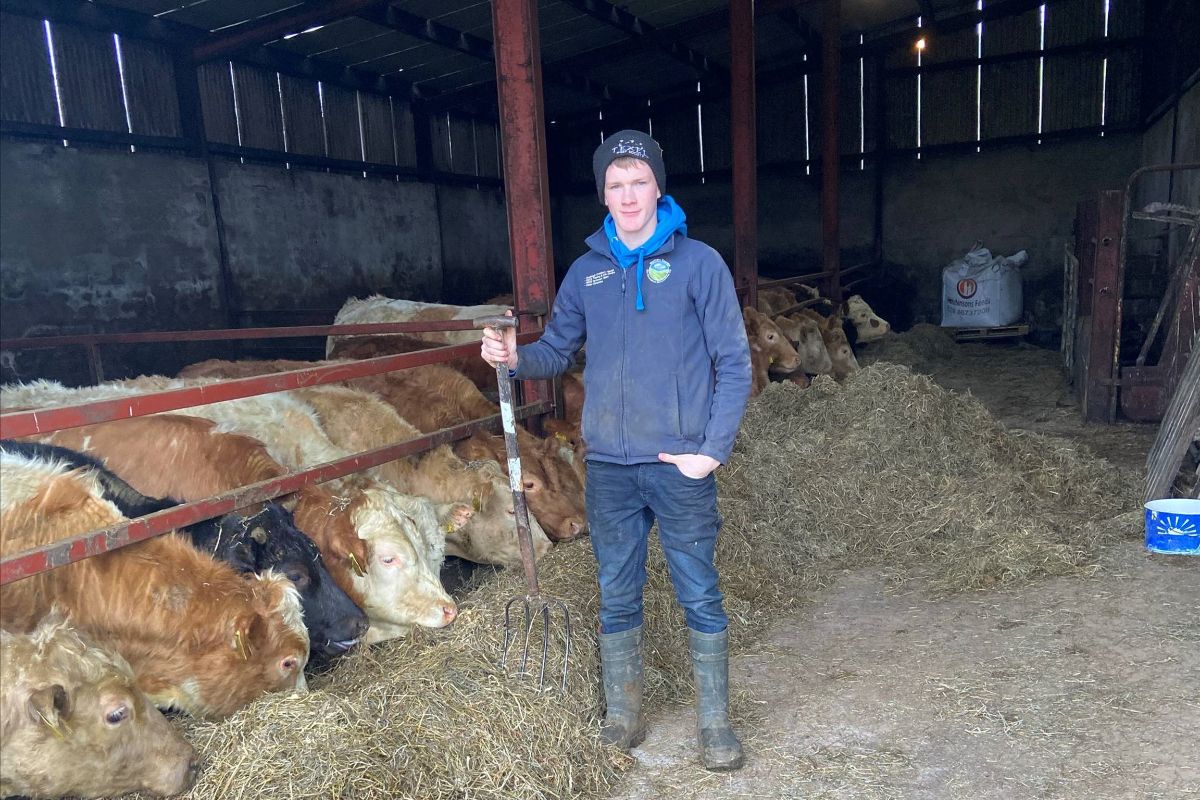In this week’s sheep segment, That’s Farming, speaks to Luke Morrison, a young farmer from Northern Ireland about establishing his own flock and his family-run beef and sheep enterprise.
Luke Morrison was just 14-years-old when he established his own pedigree Texel flock.
Two years ago, the Newmills, Dungannon, County Tyrone native laid the foundations for his now 12-ewe flock with the acquisition of two females.
The 16-year-old has grown his flock over recent years through careful selection and a strict breeding policy.
“I am trying to breed a non-extreme, but yet well-bred and presented type of sheep with great genetics to suit commercial and pedigree flocks,” he told That’s Farming.
“I am from a background where farming has been a tradition for three generations, and I hope to keep the tradition going.”
Beef enterprise
Luke runs his flock on his family farm, which he also has an involvement in alongside his older brothers, Sam and Josh, and father, David.
The primary enterprise on their small family farm involves buying 40-45 beef-bred, mainly Charolais and Limousin weanlings and suck calves from marts and privately from farmers.
They retain these right up to slaughter, taking most animals to ABP Food Group in Lurgan, Co. Armagh.
“Over the last 7-8 years, my brothers and I have expanded the small herd to make it a more profitable business by renting some extra land to both graze and cut for silage and by expanding our range of buildings to house more animals.”

Sheep farm
On the other hand, the family has in the region of 80 ewes, which they have bought and bred in that same time frame.
“My father always kept a few fat lambs or bought in ewes with lambs. However, recently, we have moved away from this and are breeding and buying in ewes and ewe lambs.”
Lambing takes place every year from around March 10th onwards, aiming for a 3-week lambing rate using a teaser ram. “We feel this is the best time to lamb as we can lamb ewes and get them outside straight away with their progeny – weather permitting.”
“Lambing earlier produces a more quickly finished lamb. Although generally, due to weather, we have to keep ewes and lambs inside for some time.”
“This does not suit our system as we have limited housing. We would be unable to accommodate ewes and lambs for long periods. We lamb all our ewes indoors. It enables us to ensure all ewes and lambs are healthy before being put to grass and makes any difficult lambings or problems easier to resolve.”
“We scan sheep every year to sort them into the correct batches for feeding. This minimises problems encountered at lambing and ensures the ewes’ nutritional needs are met.”
“We were impressed with this year’s scanning result from our new ram. We find that running a successful sheep flock requires both a good type of ewe and a good ram. Everything else comes from there.”
Breed of choice
The Morrisons run a flock of Texel-cross ewes as they feel they produce a “great, versatile animal to breed or for meat”. The family recently purchased a Bleu du Maine shearling ram and have bred all their ewes to this ram.
“We did this to produce a prolific, well-natured ewe with excellent maternal characteristics and a ram lamb with great shape, style and well-presented muscle for slaughter.”
“This year, we plan to keep 50% of ewe lambs for replacements and cull some of our older ewes,” explained the young farmer from Northern Ireland.
According to the young farmer, grassland management is key when it comes to running a successful sheep farmer. “We have to keep grass for both cattle and sheep. However, we try to minimise grazing sheep on the same land consecutively to prevent the ground from becoming ‘sheep sick’.”
“This involves having all ground well fenced for both sheep and cattle so that we can alternate them. In addition, we try to keep cattle on a paddock-based rotation of land to ensure the best management of grass.”

Following in his older brothers’ footsteps
Luke is a part-time farmer, currently in his GCSE year in school and is studying a BTEC level 2 extended diploma in agriculture.
He completed a virtual interview with CAFRE’s Greenmount Campus in Antrim. He hopes to undertake a BTEC level 3 extended diploma in agriculture, starting in September 2021, followed by an agricultural degree.
In doing so, he aspires to follow in his older brothers’ footsteps; Sam is in his second year of an agricultural technology degree, and Josh is in his first year.
“In the future, we would like to try to extend both our flock of sheep and herd of cattle and consider diversifying into other branches in the agricultural sector.”
“My advice for anyone thinking of starting farming in the beef/sheep industry is to take small precautions steps. A bad year in this area of farming could be too much for the farmer to handle.”
“Don’t consider sheep if you are afraid of a month with little to no sleep and plenty of torture,” Luke laughed.





